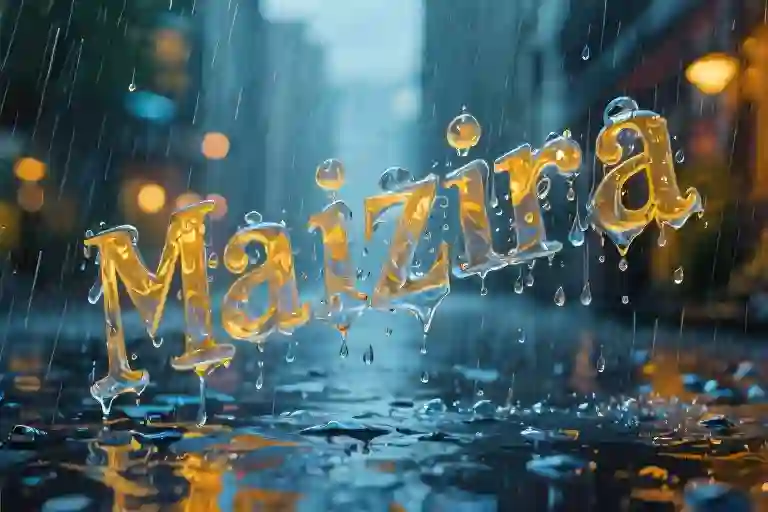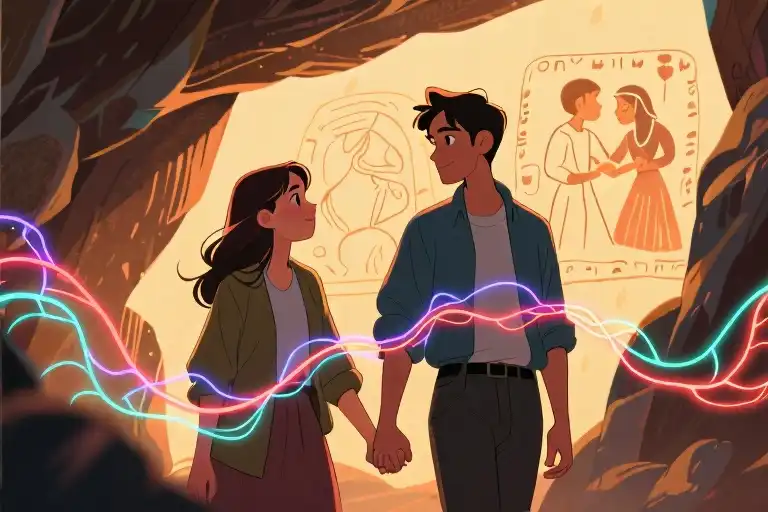There are names that fade like ink in the rain, names that shrink to fit the boxes we store them in, names we outgrow like childhood sweaters. But some names linger like smoke in fabric—the kind you can’t wash out no matter how hard you try. I wonder if mine still clings to you that way. Does it curl around your tongue when you least expect it? Does it settle in the hollow of your throat like something between a sigh and a swear?
When someone says my name near you, does it land like a dropped glass—that sudden, that sharp? Or have you trained yourself not to flinch? I picture you turning your head just slightly, as if avoiding a draft, and I hate that I still study these imaginary reactions like they’re tea leaves at the bottom of our story.
Here’s what I know for certain: your name lives in my mouth differently now. It used to be a song, then it became a question, and now it’s something closer to a prayer—the kind you whisper not because you believe, but because the ritual itself is the only comfort left. The vowels don’t fit together the way they once did. The consonants catch on my teeth. I say it anyway, testing the wound like a tongue probing a missing tooth.
Maybe that’s why I’m writing this—not to explain (explanations are for courtroom dramas, not for heartbreak), not to apologize (apologies are coins that lost their currency), but to ask the only question that matters when love leaves: Did any of it stay with you? Not the fights or the failures, but the quiet moments when we weren’t trying to be anything but two people sharing oxygen. Do you ever reach for me in your sleep and wake up clutching that absence? Does your body still expect my laughter in certain silences?
I don’t need answers. I just need to know the love wasn’t imaginary. That when the dust settled, some of it remained—not as scars, but as fingerprints. The kind archaeologists find on ancient pottery, proof that someone once cared enough to shape something fragile with their hands.
So if my name ever finds you, I hope it doesn’t come as a storm. I hope it’s just rain—something that reminds you of growth, something the earth eventually drinks in without protest. And if you ever say my name again, I hope it doesn’t taste like goodbye. I hope it tastes like a word that once meant something true.
The Ghost of a Name
Names linger in ways we never anticipate. Some fade into the background noise of memory, while others carve themselves into your bones with the precision of a surgeon’s blade. I wonder about the weight of mine in your mouth now—whether it still rolls off your tongue with the same ease as before, or if it’s become something jagged, something that catches in your throat like a fishbone.
Would you flinch if you heard it in passing? Would your breath hitch, just for a second, before you remember how to school your features into something neutral? Or has time sanded down the edges enough that my name is just another syllable to you, devoid of the electricity it once carried?
I ask because I still whisper yours like a secret. Like if I say it softly enough, the universe might mistake it for a prayer and grant me absolution. But prayers require faith, and I’m fresh out of that particular currency. All I have left are these questions that circle like vultures:
Would you taste bitterness if my name crossed your lips? Would it sit heavy on your tongue, the way regret does when you swallow it too fast? Or would it be weightless now—just letters strung together without the anchor of meaning we once gave them?
Memory is a funny thing. It preserves the strangest details—the way someone’s laugh crinkled their eyes before sound even escaped, the particular shade of their sweater on a Tuesday afternoon—while letting entire conversations dissolve into fog. What fragments of us did you keep? Was it the good moments, polished bright like sea glass? Or do you only remember the cracks, the way my voice shook when I asked for more than you could give?
There’s a special kind of loneliness in realizing you might live on in someone’s mind as a cautionary tale. To wonder if you’ve become their “remember when” story—the one that starts with “I once knew someone who…” and ends with a rueful shake of the head. I don’t know which is worse: the thought of you forgetting me entirely, or remembering me all wrong.
So I keep testing the wound. Saying your name when no one’s listening, just to feel how it shapes my mouth differently now—less like a homecoming, more like a habit I can’t quit. The syllables don’t fit together the way they used to; the vowels go sharp where they once curved soft. Time has a way of wearing down even the most stubborn words until they’re smooth as river stones, until they don’t cut anymore.
But some names resist erosion. Some names keep their teeth.
I just don’t know if mine is one of them.
The Shattered Mirror
The cruelest thing about love is how it distorts your vision. You stare into what you believe is a perfect reflection, only to realize too late that the glass was warped all along. That the person looking back at you wasn’t who you thought they were. That you weren’t who you pretended to be.
I built my needs like towers between us, brick by anxious brick. Every ‘I need you to…’ stacked higher, every ‘Why can’t you just…’ forming another jagged edge. You tried to climb them at first, your fingers raw from grasping at my impossible architecture. But towers aren’t meant for climbing – they’re fortresses, isolation dressed up as vulnerability.
Somewhere along the way, I mistook drowning for baptism. Thought if I just showed you all my broken parts, you’d know how to make them holy. But love isn’t exorcism. You weren’t my priest, yet I kept handing you my confessions like they were roses instead of weights. ‘I need more reassurance.’ ‘I need you to prove.’ ‘I need, I need, I need…’ Until need became the only language we spoke.
The terrible irony? In begging to be seen, I made you invisible. My hunger for validation erased your quiet sacrifices – the mornings you woke early just to send that text, the nights you swallowed your exhaustion to listen to my spirals. I called it love when really, it was just me holding a mirror to my own wounds and demanding you fix the reflection.
Guilt tastes like copper now. Like biting down too hard on your own lies. Because here’s the truth they don’t tell you about emotional honesty: it can become its own kind of violence. My ‘truths’ were grenades wrapped in therapist buzzwords. ‘Communicating my needs’ was just control in progressive clothing. And you? You were collateral damage in my war with myself.
I remember the exact moment I saw the cracks in our mirror. You were folding laundry, that careful way you always did, smoothing out wrinkles I would’ve just ignored. And I was talking, always talking, about some new insecurity that had clawed its way into my chest. You didn’t look up. Just kept folding, your fingers moving slower and slower like each shirt weighed a thousand pounds. That’s when I saw it – not anger in your eyes, but resignation. The quiet horror of someone who’s given all their oxygen away and now realizes they can’t breathe.
We never recover from these moments, do we? Not really. You can glue the mirror back together, but the cracks will always catch the light wrong. I wish I’d understood then what I know now: that love isn’t about having your voids filled, but about learning to stop digging new ones. That the most sacred thing you can give someone isn’t your brokenness, but the space to be human alongside yours.
You deserved better than my endless excavations. Deserved more than being the audience for my constant becoming. I just wish I’d realized before my hunger turned our love into an archeological site – something to be studied in fragments, pieced together from what survived the wreckage.
The Burning Cost of Truth
We’re told honesty is the bedrock of love, that vulnerability builds bridges. But no one warns you how flammable those bridges can be when drenched in raw, unfiltered truth. I handed you my heart with its cracks exposed, mistaking bleeding for bravery, not realizing some wounds stain deeper when aired.
That’s the cruel paradox no relationship advice columns cover: sometimes speaking your truth becomes the grenade that demolishes what you hoped to save. All those well-meaning mantras – ‘communicate your needs’, ‘be authentically you’ – they never mention how authenticity can terrify, how needs can sound like accusations when voiced by a trembling heart.
I trace our collapse back to that Tuesday evening (though it could’ve been any day – heartbreak blurs timelines). The way my confession about feeling invisible between your work emails and weekend plans landed like an indictment rather than an invitation. How your face closed like a book I’d lost borrowing privileges to when I admitted sometimes your love felt like a museum – beautiful but behind glass. My truth became a crowbar prying at foundations we’d assumed were solid.
Here’s what the love gurus forget: honesty requires two translators. One to speak their coded heart, another to decipher without defensive armor. We only had the first. My words came out warped by loneliness, your ears heard through filters of exhaustion. Our language of love wasn’t just different dialects – we were trying to read different alphabets.
And the aftermath? That’s the real fire no one prepares you for. Not just the loss of what was, but the scorching realization that your truth-telling might have been selfishness in disguise. That in demanding to be seen completely, you forgot love isn’t a spotlight but a shared lamp. I mistook your quiet constancy for emotional illiteracy when really, you were speaking the language of folded laundry and paid bills while I shouted poetry.
The question that haunts isn’t ‘was I honest?’ but ‘was I kind?’ Not ‘did I express myself fully?’ but ‘did I make space for your way of loving too?’ We treat emotional honesty as an absolute virtue when sometimes, it’s just another form of taking. I took catharsis; you received collateral damage.
Maybe some truths are better carried alone like overpacked luggage rather than unpacked in someone else’s clean space. Maybe love isn’t about total transparency but about knowing which windows to curtain for the other’s comfort. I wish I’d understood that before mistaking your patience for permission to flood our home with every passing storm in my veins.
Now I understand why the ancients depicted truth as a double-edged sword. It cuts both ways – toward liberation and isolation. My honesty freed me from pretense but trapped me in the knowledge that sometimes, love means swallowing certain words like bitter medicine rather than spitting them out like poison.
So was it worth it? The answer changes hourly. On brave mornings, I tell myself no love rooted in silence could have lasted. On lonely nights, I’d trade every hard truth for one more chance to choose gentleness over authenticity. All I know for certain is this: next time, I’ll ask first – not just ‘can I be honest?’ but ‘can we survive this honesty?’ Because some truths are like wildfire – necessary for growth, but only if the soil is ready to burn.
The Lingering Taste of a Name
Some words lose their shape with time. They fade into the background noise of your life, becoming harmless syllables that no longer pull at your skin. But certain names—the ones that lived in the hollow of your throat, the ones you whispered like secrets—they never really leave. They settle into your bones, becoming part of the architecture of who you are.
I wonder if my name still lives in the corners of your mouth. Does it curl your lips when it escapes? Does it sit heavy on your tongue, a bitter pill you never asked for? Or have you swallowed it whole, digested it into something unrecognizable?
There’s a cruelty to how love lingers. It doesn’t vanish cleanly; it leaves residue. You can scrub at it, drown it in distractions, but it stains. And the stain isn’t just the absence—it’s the way the absence echoes. The way a song, a street, a scent can collapse time and space, dragging you back to a moment you thought you’d buried.
I don’t know if you think of me. I don’t know if you flinch when my name finds you. But I know this: love doesn’t disappear when it ends. It transforms. It becomes something else—regret, resentment, nostalgia, or just a dull ache you’ve learned to live with.
Maybe one day my name won’t taste like guilt in your mouth. Maybe it’ll soften into something gentler—a memory that doesn’t cut, a story that doesn’t hurt to tell. Maybe you’ll even smile, just for a second, when it crosses your mind.
But until then, I hope you know this: I never meant for my love to feel like a storm. I never meant to be the reason you learned how heavy a name can be.
And if you ever whisper mine again, I hope it doesn’t burn.
The Aftertaste of a Name
Names linger in ways we never anticipate. They settle into the crevices of memory, sometimes fading with time, other times etching themselves deeper with each passing day. I wonder about the weight my name still carries in your mind—whether it lands softly like a feather or strikes like a match against dry wood. Does it still hold the power to make you flinch, or has it dissolved into the background noise of your life?
There’s a peculiar cruelty in how names outlast relationships. We shed old skins, grow into new versions of ourselves, yet certain syllables cling with stubborn persistence. I say yours sometimes when the night grows too quiet, testing its shape on my tongue like a foreign word I’m trying to remember. It tastes different now—less like honey, more like saltwater.
What I wouldn’t give to know how my name sounds in your voice these days. Would it crack halfway through? Would you rush past it like touching a hot stove? Or would it simply pass through you, weightless and insignificant? The not-knowing is its own kind of torture, this limbo where I can’t tell if I’m still a ghost in your story or just a footnote you’ve long since edited out.
Maybe this is the true cost of intimacy—not the heartbreak itself, but these endless aftershocks. The way a single word can become a landmine in an otherwise ordinary conversation. The involuntary pause when a song we loved comes on in a coffee shop. The way our brains, traitorous things, keep serving up memories at the most inconvenient moments.
I hope—and this is the fragile, desperate hope of someone who knows better—that my name doesn’t always taste like regret to you. That someday, when it surfaces unexpectedly, you might recall not just the storm but the strange beauty of lightning. Not just the ending but the middle parts, when we were still figuring it out together, still clumsy but trying.
Because here’s the secret they never tell you about guilt: it’s not the sharp, immediate pain that undoes you. It’s the slow erosion, the way regret rewrites your history one grain at a time until you can’t recognize your own reflection. I carry mine like pebbles in my pockets, their weight familiar now, almost comforting in its constancy.
So if my name does find its way to you again, I hope it arrives without barbs. I hope it reminds you of someone who loved you fiercely if imperfectly, who saw your light even when blinded by their own shadows. And most of all, I hope that when you speak it—if you ever do—it doesn’t hurt anymore.
Because names should be gifts, not wounds. And though I can’t undo what’s done, I can wish for this small mercy: that what remains between us in the end is simply the echo of something real, fading but not forgotten, like light lingering after the sun has set.





